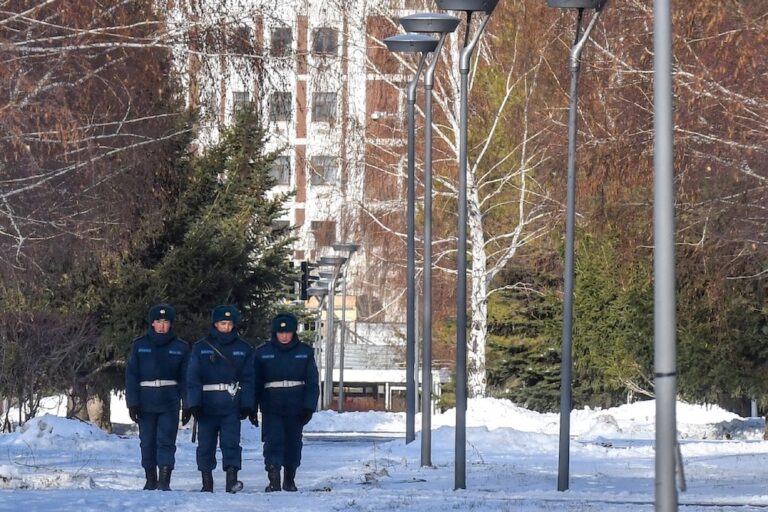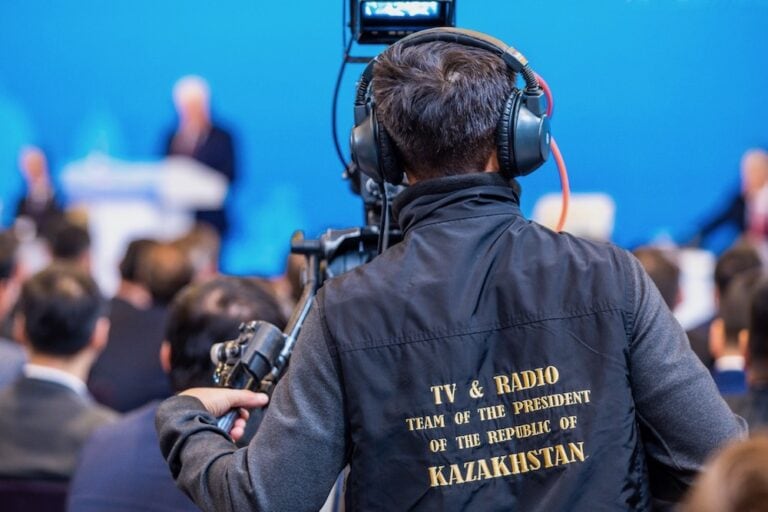**Updates IFEX alerts of 8 January 1999 and 11 November 1998** (GDF/IFEX) – The following is a GDF report reviewing freedom of expression abuses during Kazakhstan’s recent presidential election campaign: January 25, 1999 Results of election campaign research (presidential election in Kazakhstan on January 10, 1999) prepared by the Glasnost Defense Foundation and the Kazakh […]
**Updates IFEX alerts of 8 January 1999 and 11 November 1998**
(GDF/IFEX) – The following is a GDF report reviewing freedom of expression
abuses during Kazakhstan’s recent presidential election campaign:
January 25, 1999
Results of election campaign research (presidential election in Kazakhstan
on January 10, 1999) prepared by the Glasnost Defense Foundation and the
Kazakh International bureau on human rights and observance of law (Head of
monitoring group T. Kaleeva)
In order to estimate how the preparation for the presidential election in
the Republic of Kazakhstan influenced the election itself, held on January
10, 1999, and the freedom of expression situation in Kazakhstan, one should
take into consideration that by 1998 the opposition media in the country was
actually absent. Opposition orientated non-governmental broadcast media
outlets established during the first years of independence were eliminated
as a result of frequency tenders (TV companies TOTEM, M, Semeyny kanal and
others, 1996-1997) in which many newspapers of an independent orientation
were outbid by the ruling clique and changed orientation to pro-governmental
(the newspapers Karavan, Novoye pokoleniye, Kovcheg, Kazakhstanskaya pravda,
early 1998). Preparations for elections, before the constitutional
amendments of Autumn 1998, expected in 2000, started with the foundation of
new newspapers (Dat) and the activation of unpopular small periodicals (XXI
vek in Almaty, Center in Astana, Soroka in Karaganda and others).
“Psychological processing” of mass media for the purpose of frightening on
the eve of the conceived but not yet announced election of the State leader
began in May 1998 with the initiation of a criminal case against all media
outlets for “freedom of speech abuses” by the Prosecutor General of the
republic. Only one trial, that of the editor of the newspaper Ogni Priuralya
for publication of an article of allegedly pornographic content, was the
concrete result of the campaign, and came to nothing as the prosecutor
withdrew the claim.
However, in connection with this criminal case, for half a year (May to
October 1998) reports of the Prosecutor General’s office on the progress of
the investigation into several socio-political publications of the
newspapers AiF-Kazakhstan and Karavan and on the possible punishment of the
objectionable articles’ authors and of the newspapers themselves regularly
appeared in all media outlets. As a result some editions’ editors avoided
covering developments of pre-election struggles. Thus, the director of the
NS radio station issued an order banning the broadcast of all materials
mentioning Kazhegeldin’s name. The periodicals AiF-Kazakhstan, Express and
others refused to publish materials criticising preparations for the
election.
From the mass media position, the entire pre-election period may be divided
into two stages. The first – nomination and registration of candidates for
election, the second – agitation for candidates for the presidency.
In the first stage, the main task of the authorities was not to allow A.
Kazhegeldin’s registration. Many of the editions deviated from this subject,
considered dangerous to their well-being. Actually, non-official censorship
was put in force in the regions. In Shymkent city, officials of the
municipal administration looked through issues of independent newspapers
directly before putting them into circulation and withdrew objectionable
information. In this way, they withdrew material on violations during the
election campaign from the independent newspaper Svoya gazeta and A.
Kazhegeldin’s open letter from the newspaper Yumax-inform. The critical
attitude of the international community towards the presidential elections
in Kazakhstan was presented in most non-governmental editions in brief form.
Pro-governmental press did not publish a single report of such a kind.
The authorities applied rather diverse means of suffocating media outlets of
an openly opposition orientation. Established in April 1998, opposition
newspaper Dat was repeatedly inspected by fiscal agencies and copies of
several issues were withdrawn under the pretext of customs rules violations.
Later, upon publication of materials on Nazarbayev’s financial status,
editorial computers were confiscated. Finally, the newspaper was declared
bankrupt and ceased publishing in December 1998: the court ordered Dat to
pay 35 million tenge (US$ 400,000) for allegedly insulting the honour and
dignity of E. Catybaldiev, director of the state TV and radio company. They
first tried by administrative means to revoke the license of the opposition
newspaper XXI vek, then they threw a molotov cocktail into the editorial
office. The Almaty printing houses refused to print both newspapers, and the
state-run distribution network Dauys refused to sell these editions. In
Karaganda city the court suspended publication of the independent newspaper
Soroka until January 8, 1999, under the pretext that the imprint was lacking
data indicating the place of the newspaper’s printing.
In Astana, the printing house cancelled a contract with the independent
newspaper Center. On October 19, tax police officers seized editorial
foundation documents, stopped expenditure operations on banking accounts and
prolonged check-ups that actually paralysed the newspaper’s activity until
January 12, 1999.
During the agitation stage, the principle of equal access to the mass media
for candidates was grossly violated. From December 21 to January 3,
representatives of the European Institute for the Media carried out a
mission monitoring the Republic’s media coverage of presidential elections.
According to its information, announced at a press conference after the
election, of the overall coverage of candidates on national television,
Nazarbayev received 76 %, Gabbasov 12%, Abdildin 7 % and Kasymov 5 %.
According to the same observers, private TV demonstrated similar tendencies.
In the regions, broadcast time was granted solely to Nazarbayev and the
other candidates were mentioned only casually.
Print media, except for the newspapers 451 Fahrenheit , Dat and XXI vek,
devoted the greatest amount of space to N. Nazarbayev.
In general, biased coverage of the presidential election in the Republic of
Kazakhstan was a consequence of the weakness and small numbers of the
opposition media, of the different kinds of pressure exerted by authorities
accompanied by the fear of authority remaining from the Soviet era, and by
the lack of experience in political campaign coverage among the majority of
periodicals.


